#i asked my parents (taiwanese immigrants) about this and they said we use either but prefer lunar new year
Text
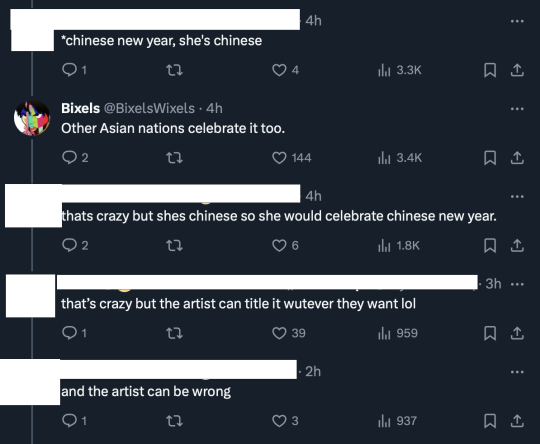
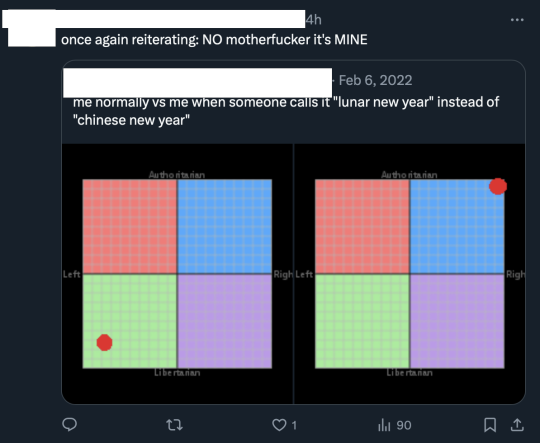
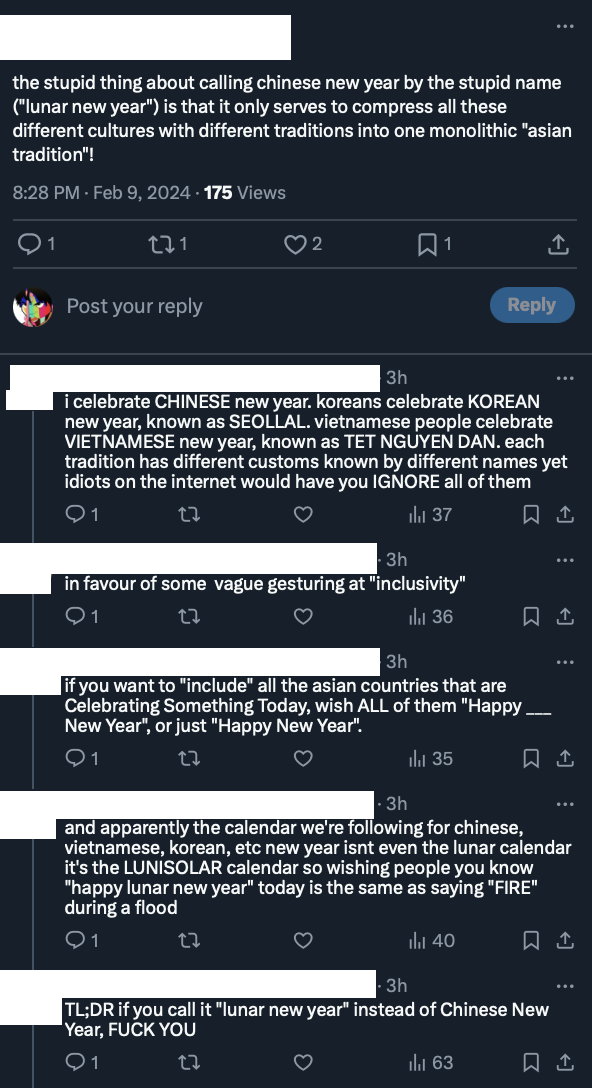
Jesus man, relax.
#this was in response to me saying “lunar new year” on the rarity art#personal#delete later#what in insane nonproblem to get this angry about#i asked my parents (taiwanese immigrants) about this and they said we use either but prefer lunar new year#because it's inclusive to koreans and vietnamese people who celebrate on the same day#lunar new year is an umbrella term same as “happy holidays.” this person is basically getting mad i said happy holidays instead of#merry christmas.#my family and i identify more as taiwanese than chinese so. we're not gonna say chinese new year much anyways#i sent this to my mom btw and she replied with basically “die mad i guess.” love you ma#this literally doesn't matter anyways i could have said “chinese new year” to caption that post and it wouldn't have mattered#the only reason i didn't is because i plan on drawing another art including carol (coco pommel) who's korean and celebrates the same day#like. most people in china/taiwan don't care they just say “happy new year” cuz it's the fuckin new year. someone saying lunar new year is#not erasure it's not flattening asian identities into a monolith. it's just an umbrella term.#anyways happy lunar new year happy chinese new year happy tet happy spring festival happy seollal#like i cannot stress enough to you guys that these holidays are on the exact same day and celebrate basically the same exact thing.#this is not an issue.
1K notes
·
View notes
Note
Question 0-0 I’m writing a historical fic (Ming dynasty to opium wars if that helps) with both HK and Macau in it (also has the rest of the gang), should I use the official Hong Kong Cantonese romanization of HK’s name or not because idk if the official Hong Kong romanization existed at that point, if not, how should I write his name? (I feel like you’re the name authority now lol so that’s why I’m asking 😆)
Romanisation of Cantonese in HK (+ other Chinese speaking countries)
Ahhh this is quite a complicated question. I'll try my best 🙈🙈🙈 Remember, I’m not a linguist nor a historian, these are only information I researched and based on my own knowledge. I could answer you right away that it’s safest to stick to the HK system for HK’s name now, but since romanisation has something to do with history, I thought this bit of insight would interest you and some others as well?
Basic facts
The standard English romanisation of Cantonese the HK government uses was introduced in late 1800s to early 1900s after HK was colonised and Hanyu Pinyin (Mandarin pinyin) in the 1950s after the PRC established, both did not exist back in the period you mentioned. So even Yao might not be Yao back then! (but I’ll talk about that later)
Also, the language has evolved a lot since then, plus there are also many other dialects (that are not mutually intelligible with Cantonese or Mandarin), this could play a role in it too!
Cantonese
How the system worked in Hong Kong 🇭🇰
So I only heard this from my parents and grandparents! Back then (30s - 50s) people just went to the registration office and said their names in Cantonese, the officers (mostly British I think) would hear it and translate it on the spot. I have yet found an official romanisation guide by the HK government (unlike Macau), but I believe with time, they kind of built up a system? HKers are used to the romanisation and would just know how to romanise names. There are some cases with names romanised not in the usual way, like 林 is usually Lam (99% of the time), but there are some romanised as Lamb, could be because of the mistakes made by some officers or they weren’t too used to the system, it does happen sometimes, but they are rare.
The government probably has a system for the street names, but it’s also a mess, they don’t necessarily reflect the pronunciation well, one obvious example would be “G” to “K” like the “K” in Hong Kong, it’s pronounced more like “Gong” in Cantonese, name romanisation has this problem too, but that’s another story.
Pre-colonial Hong Kong
Hong Kong was of course in the Canton/Guangdong region back then, there isn’t really like a border or anything like now. As the name hinted, the region speaks Cantonese. I couldn’t find that much information on the people living in HK, but one of the most famous people active around the HK area was 張保仔 Cheung Po Tsai, a pirate, active in the late 1700s. He wasn’t born in the area that is now known as Hong Kong, but HK was the area where pirates were active, because it’s surrounded by the sea. His name is romanised using the HK romanisation system, but I believe this is how the HK government preserves history. Mind you, this is the modern HK romanisation, his name might not be romanised like that back then, but I couldn’t find further info.
I believe only some people’s names were romanised in Cantonese because (Nanjing) Mandarin was the language the government used (which I heard was quite different from the Beijing dialect, aka modern Mandarin). There were only a few exceptions to have their names romanised in their native dialects (Cantonese, Hokkien, etc) to highlight their heritage/ importance to the region.
Hong Kong before the colonial period was very small and there weren’t a lot of people living there, most of our ancestors fled China for HK due to wars or political instability, but that was mostly after the Brits took power. So I’d say, for the sake of simplicity and also due to lack of information, using the HK system now would be fine, which is Wong Ka Lung or Lee Siu Chun, it also shows his identity (from HK) and his language. See this post for more info on his name.
Macau 🇲🇴
I have to also mention that even among Cantonese, the romanisation could be different too! Macau’s system is similar to HK’s but not 100% the same, this is because their system is based on Portugese pronunciation. Some common differences are Leong instead of Leung in HK or Ao instead of Au in HK. I’m not quite sure when they started using the system, but the document I found from the Macau government in 1985 showed they had a system for quite a while.
My bet for Macau is that his name was probably already romanised based on the Portugese system at that time, he’d probably also be given a Portugese name for the ease of communicating with the Europeans too. I have 2 names for Macau: 王濠鏡 Wong Hou Keang, popular among the Chinese fans which is based on one of Macau’s old names (I romanised his name wrong in my previous post using the HK system) and 王嘉麟 Wong Ka Lon, suggested by a HK fan, it shows his relationship with HK sharing the word 嘉 (many parents give siblings a sharing name). I use Vicente or Marco as his Portugese name. I can do a detailed post on this later.
Mandarin
Pre-PRC China (pre-1949)
Before the PRC was established (and Mandarin pinyin was introduced), I believe each country had their own method of romanisation for Chinese (all different dialects), probably catered to their own speakers. Wikipedia said Nanjing dialect-based romanisation systems are more commonly used until the late 19th century, but I can’t really confirm that, since I don’t speak the dialect and I couldn’t find much info on that. But it could make sense, Nanjing was once the capital and a very important city, I could see why that would be the case.
If you look at this book from 1742, you can see the romanisation is very different from what we are used to, it's a French book so it’s based on French pronunciation, on top of the fact that the language back then was a bit different than nowadays (both French and Mandarin).
A notable example would be Confucius. It’s the latinised from 孔夫子 (Kǒng Fūzǐ in Mandarin pinyin) in the late 16th centuries by the early Jesuit missionaries in China, which consisted of mainly Italians, but also Portugese and Spanish I believe. Nowadays, of course his name wouldn’t be romanised like that, but this name was made popular by them based on Italian/Latin I think. In theory, his name would probably be based on the Nanjing-dialect, which I have no clue of, it does sound like Beijing Mandarin though.
Wade-Giles I believe was the most used romanisation system pre-pinyin. It was created in the 19th century and based on the Beijing-dialect. This may not be obvious if you look at important people in the modern (mainland) Chinese history because the Chinese government has probably changed the records to make the status of Mandarin pinyin more important (eg. Peking to Beijing). However, you can still find some hints in Chinese living abroad or non-mainland Chinese (most prominent example would be the Taiwanese).
Michael Shen Fu-Tsung was one of the first Chinese people who moved to Europe (late 1600s, from Nanjing/Nanking), he was using his Portugese name Michel Alfonso most of the time when he was in Europe, but his Chinese name was romanised using the Wade-Giles system later, could be because his life was more well-known in the west than in the east, so when Wade-Giles became popular, the European used the system when they refer him by his Chinese name?
All in all, China’s name would probably be romanised differently in each period by different countries. Not sure about Nanjing-Mandarin, but in Beijing Mandarin, his name 王耀 would be romanised as Wang Yao in both Mandarin pinyin and Wade-Giles luckily.
Taiwan 🇹🇼
Taiwan still used Wade-Giles until the government started encouraging the people to use Mandarin pinyin in 2009. I would say if you’re using 林曉梅 (Lin Xiao Mei), Lin Hsiao Mei would be more accurate to the time, for 林乙玲 (Lin Yi Ling) it’s Lin I Ling according to this. For Wade-Giles, names were usually hyphanated too I think so that the westerners know they have to use both words to refer to a person’s name, so Lin Hsiao-mei or Lin I-ling? (It’s not important, I just wanna mention my observation)
Taiwan also has another official language, which is Taiwanese (Hokkien). Now I don’t speak Taiwanese, but it’s also an important representation of the culture too and some people’s names were romanised from their own dialects, which leads me to my next point...
Other dialects
Some names were romanised from their own dialects, an example would be Koxinga from 國姓爺, or 鄭成功 (Zhèng Chénggōng in Mandarin pinyin). It’s the Dutch romanisation of Hokkien. From his name, you can probably tell why his name was romanised this way. He was of Hokkien and Japanese descent and he was most active in Taiwan (well, the sea regions, his family were pirates), hence he had most contact with the Dutch (he eventually replaced Dutch Formosa with Kingdom of Tungning). His name was also romanised differently, either from Beijing Mandarin or based on other languages, but I supposed he was most well-known by Koxinga.
Most of the Chinese immigrants in Singapore, Malaysia, Indonesia, the Phillipines and Myanmar are of Hokkien (Hoklo) descent. I believe this is why many Chinese names are romanised differently in these countries, say the surname 陳 is usually Tan in Malaysia because it is romanised from Hokkien or Teochew (it’s Chan in Cantonese and Chen in Mandarin). This could theoretically happen in HK too, but most people wanted to integrate into the community and the majority of HKers speak Cantonese (eg. my grandparents were Shanghaiese but their names were in Cantonese).
Cantonese in Pre-PRC mainland China
This is just an extra piece of information if you’re interested, it’s about Cantonese in mainland China after British Hong Kong was established (mid-late 1800s), which is probably not your subject of interest, but maybe if someone wants to do an oc, or idk, just want to know in general? Long story short, there’s still not really an offical way to romanise names, but in my opinion, you can tell someone’s story/background from how their names were romanised.
Cantonese like 康有爲 Kang Youwei and 梁啓超 Liang Qichao were romanised like that (pinyin) because they worked at the Chinese government and I think the Chinese government now romanised them like that? Their names were probably not like that back then, not sure.
Another example would be 孫逸仙 Sun Yat-sen. He was Cantonese, born and was mostly active in the Canton(Guangdong) region. He’s more well-known as 孫中山 in Chinese (he had a lot of names), but he mostly went by Sun Yat-sen when he’s with westerners since he studied in HK. It looks a bit different than modern HK romanisation (it would be Suen Yat Sin I think), but I believe it was because that was the time the HK government just started developing the system, and as I’ve mentioned, there are some exceptions when romanising names in HK.
And then we have Chiang Kai-shek, who was not Cantonese (he spoke Wu, another Chinese dialect) but his name was romanised from Cantonese, probably because of the KMT activities he participated in were in Canton/Guangdong? He did change his name and the romanisation for his political career (he went through a lot of names too, I don’t speak Wu unfortunately to tell you whether one of his names were romanised from Wu, but some were from Mandarin using Wade-Giles). His name looks like it’s romanised using the HK system to me, it could really be that the Cantonese in the Mainland adopting the system when it was developing and got popularised in HK.
Cantonese might not be the main language used by the Chinese government (even though it almost became the official language of modern China), but since Canton/Guangdong was an important trading spot (on top of HK and Macau), many foreigners would learn Cantonese too.
Conclusion
Romanisation is to aid their own countries, it would be catered to their own languages, Turkish doesn’t have the letter Q, or W is pronounced V in German, Yao’s name in German could be “Jau” if the Germans were to romanise his name to cater their own people. The influence of the countries contributes a lot in it too. As you can see there are many names romanised from Dutch, because the Netherlands was a strong power, so I guess that’s why sometimes the Dutch romanisation would be more used? The HK romanisation and Wade-Giles got so popular probably because the British Empire was so strong back then or that English became an international language. And of course there is history too. Taiwan’s old name, Formosa, means beautiful in Portugese, because the Portugese were the first Europeans to discover Taiwan.
There are still so many different romanisation systems nowadays, one can tell where you’re from or where your root is just by seeing your romanised name. Say the surname 鄭, it’s romanised as Cheng in HK and Taiwan (different languages though), Cheang in Macau, Zheng in China and Tay or Tee in Malaysia and Singapore (Trịnh and Jung/Jeong would be the equivalent of the name in Vietnamese and Korean respectively) and they are all based on different languages, romanising different languages/dialects based on different languages.
Again, I’m not a linguist nor a historian so I might not be 100% correct! Please correct me if I got any of these wrong! Sorry for turning this into an essay lol, I really really appreciate your effort on making your fic historically accurate! Feel free to ask me more, I’m glad to help!
#writing reference#chinese names#Aph Hong Kong#aph macau#APH China#aph taiwan#hws hong kong#hws macau#hws china#hws taiwan#hetalia#I spent 2 weeks on this lol#Sorry it took me so long i wanna make sure i got the info right and i was busy with personal stuff#vulpes stuff
77 notes
·
View notes
Text
tips for surviving the pandemic: things i learned from my immigrant parents
It’s hard to believe that it’s only been a little over a week since the WHO announced that the coronavirus (COVID-19) was officially a pandemic. This has been a long, challenging week for a lot of people and it is nothing short of terrifying to read reports of what is happening in Asia and Europe as many predict that we’ll likely endure a similar fate here in the United States. In the midst of all of this chaos and uncertainty, I’ve been reminded of so many lessons that my Taiwanese immigrant parents taught me. I’m sharing them here so that others might also benefit. Thanks Ma. Thanks Daddy.
你昨天已經出去了.
“You already went out yesterday.“
1. Learn how to stay home. Our family is eight days into self-isolating at home and Tony asked me this morning if I had cabin fever. And strangely, the answer is no. I’m not. Not to downplay the difficulty of this moment but my experience with this “shelter-in-place” ordinance reminds of pretty much all my summers between kindergarten and 8th grade. Both of my parents worked full-time so summer was just three blissful months of nothing. No structure, no plans, no camps, no playdates, and no responsibilities. My parents never made me feel like I was missing a thing by staying home and I don’t remember ever feeling bored. There were always library books to read, stories to write, and thoughts to journal. Hours were spent playing school with my big sister (now a first grade teacher!), making up random games like who can avoid touching the carpet longest, learning Kim Zmeskal’s latest gymnastics floor routine, writing lyrics to Kenny G saxophone solos, and rehearsing for our variety show that we would perform to our tired parents at the end of the day. And that’s not even including the hours we spent watching The Price is Right, CHIPS, Knight Rider, and Airwolf (yep, no cable).
As a teenager I carefully plotted all my hangouts with friends so that I didn’t have too many consecutive days when I was out of the house. Whenever I asked my parents if I could hang out with friends, they would always say, “But you already went out yesterday. What’s wrong with staying home? Why do you always have to go out?” It was as if having too much fun two days in a row was off limits. If there was a big party on Friday, I would purposely make sure I stayed home Wednesday and Thursday just to increase the chances of being able to go out on Friday. I know a lot of people talk about how awful their high school years were but I was one of those lucky kids who had a really great group of friends that made me feel seen, loved, and cared for. The downside was that I couldn’t get enough of it. I was always thinking about the next hangout, the next event, the next thing. It took me all the way until my late twenties to fully appreciate the fine art of staying home and to finish my unexpected transformation into the expert homebody that I am today.
I’m reminded of that old quote by Blaise Pascal, “All of humanity's problems stem from man's inability to sit quietly in a room alone."
It’s great to be out and about, but it’s also really important to learn how to stay home.
______________________________________________
晚上要吃什麼?清冰箱.
“What are we eating for dinner?” “Cleaning the fridge.”
2. Be creative with what you have. I love food. Not in a foodie sense, but I get a lot of pleasure out of eating. I’m not a food snob by any stretch of the imagination. I thoroughly enjoy a Stouffer’s frozen lasagna or a peanut butter and jelly sandwich as much as I enjoy a fancy, inventive, Michelin-starred meal at Commis. What’s hard for me is when food is eaten as sustenance rather than with delight. But my parents taught me that you can always take pride in preparing a meal. No matter your ingredients.
My mom is an excellent cook. I know a lot of people think their mom is a good cook but my mom is legitimately skilled in the kitchen. There were some nights when I’d ask what was for dinner and my mom would just reply, “Cleaning the fridge.”
Now for some, this might sound terrifying. But my mom could honestly make something out of nothing. I still crave my dad’s simple egg and garlic fried rice. My parents raised me to be able to make an tasty meal just from rummaging in the pantry and fridge for random leftover things. There were plenty of summers where lunches and snacks were an individual culinary adventure for each of us kids. I still remember the day I witnessed my baby sister add a Kraft single on top of her onion ramen noodles. She saw my confusion, shrugged and said, “You should try it, it’s good.”
With all the hoarding folks have been doing during this pandemic, I’ve found myself feeling quite anxious. Trying to calculate if we have enough food. Estimating how many more meals we can eat at home before we need to make another grocery run. As someone who struggles with a scarcity mentality it has been hard not to panic. But then I keep reminding myself that I know how to make good food using just whatever’s available.
You know, I was pretty disappointed with Mary H.K. Choi’s second novel, Permanent Record, given how much I enjoyed her debut novel, Emergency Contact. But I was absolutely thrilled with the shine she gave to what her protagonist calls “Hot Snacks”.
Here’s an excerpt from Permanent Record that is a beautiful ode to creative food mashups and immigrant kids everywhere:
“I edit and post a Shin Ramyun Black video set to music. My favorite instant noodles with three flavor packets and so much garlic. It’s a classic Korean HotSnack, especially when you throw in cut-up hot dogs, frozen dumplings, extra kimchi - and this is where the artistry comes in- eggs, cheese, corn from a can, and a drizzle of sesame oil on top. And furikake if you’re feeling wealthy. The next night I put up a bacon, egg, and cheese not in a bagel but in a glazed honey bun. Laced with sriracha and pan fried on the outside. Then it’s chilaquiles with Spicy Sweet Chili Doritos and chorizo. Jamaican beef patty casserole disrespected with a smothering of Japanese curry and broiled. With Crystal Hot Sauce over the top and pickled banana peppers. I’m trolling with that one but the controversy is berserk. When I run out of old videos, I make saag paneer naanchos with Trader Joe’s frozen Indian food, and it’s a hit. Especially when I add yogurt and a thick layer of crushed-up Takis on top.”
______________________________________________
看連續劇.
“Watch soap operas.”
3. Find a way to escape. I’m generally pro technology but I’ll admit I’m a little bummed at the way iPhones and iPads have made TV viewing such an individual activity. I like how Disney+ has gotten some families back to watching TV together again. Although I will say, we really coddle our kids these days. I grew up in a time when movie ratings only applied in the theaters and we watched movies with our families like Alien, The Fly, and Gremlins. We were scared out of our minds and sometimes could only watch through the cracks between our fingers covering our eyes because it was so scary. Okay, this also might be why I can’t watch horror movies as an adult.
From a young age, my parents taught me that watching other people’s drama unfold on screen is one of the best way to escape your own drama. Some people say binge watching became a thing when the TV networks started releasing shows on DVD. Others give credit to Netflix releasing their original content a whole season at a time. But truth be told, I first learned how to binge watch from my parents.
We would rent 30-40 VHS cassette tapes from that random spot in Bellaire Chinatown. Can you picture it? You needed multiple plastic bags to transport that many VHS tapes.
Do you remember the one about the dying mother who needed to find homes for each of her 7 children? I don’t think it’s normal for a 10 year old to cry so much but you better believe it’s made me learn the true value of a soap opera escape hatch.
Are you in a pandemic? Now’s the perfect time to pick up that YA novel, binge that reality show, start that kdrama, or rewatch all six seasons of The Sopranos again.
______________________________________________
下個禮拜會下雨.
“It’s going to rain next week.”
4. Be informed about what’s ahead. If you ask either of my parents about the weather at any given time they can reliably tell you the daily percent chance of precipitation and humidity for at least seven days out. They’ve always been this way. They would inform me of the weather at various points throughout the week. They planned their yard work and car washes around the weather forecast. There’s something about the way the weather forecast is available to everyone. And it feels like it’s just a matter of making the small extra effort to access it and gain a slight advantage. I feel like so much of the immigrant mentality is to be diligent in making the right choices to not screw yourself over and seizing opportunities whenever you can. And it wasn’t just weather but this is such an obvious example of it.
I remember my dad saying to me once, "Can you imagine if someone decided to read every book in their local library? If they just went shelf by shelf and systematically read all the books? You could do it, you know. It’s free, it doesn’t cost any money to check out a book from the library. But no one really does it.”
I think immigrant parents get a bad reputation for forwarding chain letters and health/science hoaxes they get on email, WeChat and Line. And in a pandemic, yes, they are definitely susceptible to misinformation, rumors and flat out untruths. But the thought behind it seems right.
The mistrust of government leadership is actually quite relevant right now in this pandemic. Many immigrants left countries with governments that were overtly corrupt, oppressive, and used propaganda to influence its citizens. And while many Americans still take pride in living in a country that verbally champions freedom and democracy, the truth is that our government has already failed us and lied to us in many ways. During this pandemic, we cannot wait on leaders to tell us what to do. We must be diligent in reading for ourselves, seeking experts, using our critical thinking skills, and making preparations accordingly.
______________________________________________
會不會冷?
“Are you cold?”
5. Check in with yourself. Check in with others. I have so many memories of my parents walking through the living room and asking me and my sisters if we were cold. It felt like they couldn’t walk past the thermostat without asking us if they needed to raise it or lower it. As if they couldn’t hear us sneeze and wonder if they needed to turn off the ceiling fan. They couldn’t see us sitting in a dim room without turning on a light for us. There are so many times I fell asleep reading on the couch and woke up with a blanket over me. Or sometimes I was fully awake doing something random, like playing Egyptian Rat Screw with my sisters (a cardgame for the uninitiated), and my mom would walk by and wordlessly drop a warm, heavy blanket over my shoulders. That’s care, y’all. Consistent, immediate action, and often without words.
The tip here is to pay attention to your discomfort during a pandemic. There’s this immigrant stereotype of stoicism and that’s true to some degree but maybe the resilience is made possible not because of unnatural toughness but largely because immigrant parents can also be so incredibly perceptive and tender in some very tangible ways.
When everything is chaotic around you and you’re busy multitasking these next few months, don’t ignore your needs. Notice how you’re feeling. Physically and emotionally. Where are you carrying your stress and tension in your body? You don’t have to tough it out. Oh and remember to check in with your people on how they’re feeling. Is there a light switch you can turn on for someone?
______________________________________________
笑死人.
“Laugh to death.”
6. Laugh to survive. Look, we didn’t have the perfect family or anything like that. We’ve definitely had our share of difficult times, financial stress, health issues, arguments, and pain. But my parents also really knew how to laugh and taught us to laugh with abandon. Like, bent over, tears running out of your eyes, can’t breathe kind of laughing. Our dinner table was kind of like a writer’s room. It was difficult to tell a mediocre story. You had better come prepared with a punchline or a point. It was a tough crowd, every night. On many occasions I stopped myself halfway through a story upon the self-realization that there was no real way to land the plane. Polite laughs were nowhere to be found, except perhaps a charitable smile from my baby sister. But it didn’t stop us from trying. I think my sisters and I are all probably better storytellers for it and we definitely have learned to try to bring humor into difficult times.
I know that this pandemic is so incredibly dark and depressing that it can sometimes feel disrespectful, inappropriate, or childish to laugh at anything. But my parents taught me that you laugh to survive. Nothing is ever so dark that you can’t find a reason to laugh. And sometimes you really need to find something to laugh about.
I’ve been taking long breaks each day from major media news outlets but I have been finding such joy and laughter from the meme creators on IG and the comedic geniuses on Twitter. In Taiwanese when something’s really funny, people will say a phrase that is imperfectly translated as laugh to death. Like you killed a person it was so funny. Now’s the time to find that content or those people who will get you to laugh to death.
______________________________________________
我要去挪車.
“I’m going to go re-park the cars.”
7. Go to bed with a plan for the next morning. I grew up in a suburb of Houston, Texas where one property developer built the entire neighborhood and used the same eight or nine floor plans for all the houses but changed up the brick and trim color to keep things interesting. Most homes have a long driveway that connects a garage set near the backdoor of a home to the street. By the time I was driving, we had four cars in total -- two in the garage and two on the driveway. At the end of the day when everyone was home for the night and my dad was getting ready to go to bed, he’d announce, “I’m going to go re-park the cars.” Then we’d all kind of stop what we were doing and rearrange the order of the cars to match our morning departure schedules. This meant figuring out who was leaving when in the morning and sometimes also prompted brief check-in conversations about any changes in our usual routine.
In a pandemic it can sometimes feel like there are a million different things to attend to and large conceptual concerns that demand your attention. But there’s something calming and centering about spending a few minutes each night thinking through specifically what needs to happen just tomorrow. Not the day after or next week. Get super tactical and specific about what tomorrow morning looks like. Check-in with your partner about any aberrations to your schedule (e.g. I have a super important conference call at 7am tomorrow) to minimize any unnecessary surprises. There’s something magical about setting up your morning that helps you rest just a little easier at night.
______________________________________________
星期三我們有禱告會.
“On Wednesdays we have prayer meeting.”
8. Make time for your spirituality. Growing up my parents both had physically demanding jobs. My mom was a seamstress for many years, providing alterations at my aunt and uncle’s dry cleaners. She later worked in an elementary school cafeteria and then eventually became a classroom aide for special needs students. My dad worked at that same dry cleaners for years until he got a job at the post office. He then became a letter carrier, delivering mail on foot. The summer months were especially grueling, carrying a heavy sack of mail in 100 degree, humid weather, and walking until sweat soaked his shirts and blisters formed on his feet. They had every excuse to skip weeknight events. But unless they were sick in bed, I can’t remember a time when they missed their weekly prayer meeting with their friends from church.
Pandemics have an unsettling way of forcing us to confront our mortality and can trigger a bunch of unresolved shit that has been bubbling underneath the surface. We’ve lost some of our usual coping mechanisms and it can be super hard to quiet the anxieties, fears, and other demons that we usually try to keep under control. This isn’t a lecture about a particular faith or belief system. It’s just a reminder to prioritize your existential questions, your interior life, and your connection to things much bigger than yourself -- whether that’s a community, a yoga practice, a faith group, a tradition, or something else.
I have a fledgling meditation practice that I’ve been trying to strengthen since last year. When I say fledgling I mean that sometimes I bail before the ten minutes is up and check my phone. Even though I’m not very good at it yet, I can really tell the difference on the days that I make time for it. Our church started hosting its weekly Sunday service online and that’s challenging for me because a church service feels like it’s designed to be so much about the physical rhythm of going to a place, seeing faces of people I love, hearing their voices co-mingling with mine in song and in prayer, and tasting the bread and wine in my mouth. The online service was short, and just for viewing through a zoom conference call, but there was still something meaningful about setting aside that time Sunday morning, asking our wiggly kids to be present, and saying the liturgy out loud knowing that in homes all across the country, other people are doing the same.
If things are really going to get as bad as some are predicting, we’ll need the spiritual strength to make it to the other side. Those habits are hard to form overnight. My parents taught me that you really have to make the time for your spirituality non-negotiable, so that you won’t abandon it when it’s inconvenient or when you are too tired.
______________________________________________
沒辦法.
“What choice do we have?”
9. Rise to the occasion. Whenever my parents are telling old war stories about things they had to do to get to where they are today, inevitably one of us will say, “Man that’s crazy, how did you manage to do it?” And instead of pointing to some super personality trait of theirs or some complex self-help principle, they always say, “We had no choice.” It’s not said in a defeated way, but in a posture of accepting that life can be cruel, unfair, and capricious. And that it’s not helpful to dwell too long on the why’s and how’s. My parents taught me that you can’t stay in despair mode. You eventually have to push yourself into problem solving mode and you do whatever it takes to move forward.
This coronavirus is so unlike anything we’ve ever experienced in our lifetime. It is so unprecedented for me that my brain is having a hard time processing the reality of what’s happening right now and the rest of my lived experience. I spent the first few days of this week just being overwhelmed, anxious, angry, and irritable. At this point though, I’m in go mode. I’m doing what needs to be done for our family and taking care of business. What choice do we have? I can hear my parents saying it. One day, if we’re lucky, we’ll say it to our kids too.
#coronavirus#immigrants#immigrant parents#survival tips#advice#covid-19#pandemic#childhood#lifelessons
15 notes
·
View notes
Text
Still unsure what I got myself into, but 3 weeks prior to this trip, I simply told my parents, “I’m going to Taiwan,” and the first solo travel to a country I have never set foot on happened.
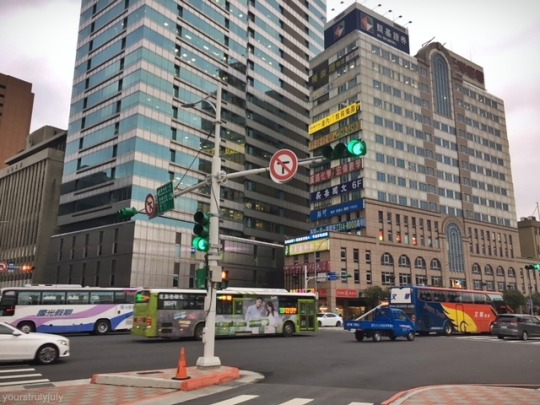
Trust me, it was not the broken heart that prompted me, not even the thought of possibly seeing Dao Ming Si and the rest of F4, nor the plethora of dimsum goodness in their night markets. Blame it on adrenaline, maybe?
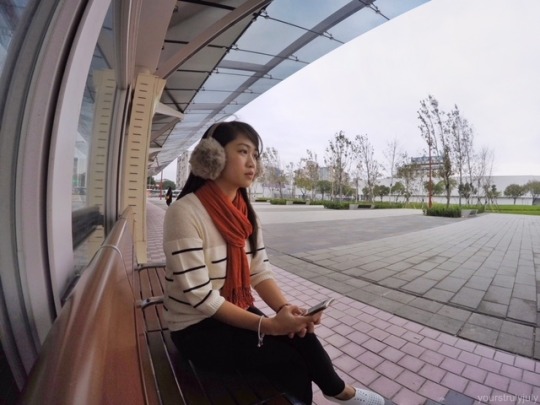
It was not my first time abroad and not my first solo trip either, but the struggle was real when I had to pass through Philippine immigration and prove myself that I deserved to travel alone and that I was worthy of that vacation. Haha.

Disclaimer: This is not a legit travel guide, so read at your own risk. Hahaha. I tried to put the details and links that might help you if you ever plan to visit Taiwan. Starting November 1, 2017 until July 31, 2018, Filipinos are granted visa-free entry to Taiwan for 14 days. UPDATE: It has been extended to July 31, 2019! I went there on the first week of December 2017 which kicks off the winter season.
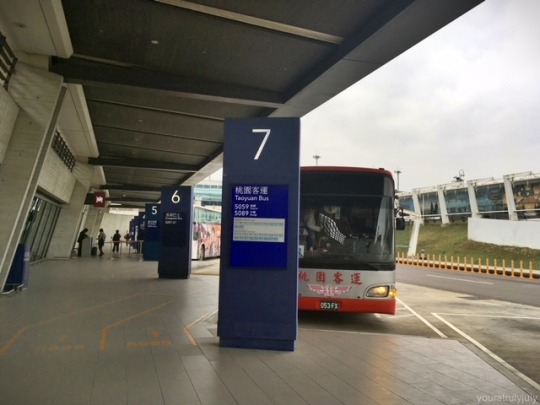
I checked in at Taipei Taipei Hostel where everything is strategically located especially the Taipei Main Station. From Taoyuan International Airport, I traveled for about an hour to the main city via Kuo-Kuang Bus 1819. (Fare at NTD125/P222) Also, getting an Easy Card made every commute more convenient and hassle-free.

A rare sight in the heart of the city is one of the gates of Taipei City Wall, the North Gate or Cheng-en Gate. Day one was spent wandering along the bustling streets of Taipei, visiting Sun Yat-sen Memorial Hall (and chanced upon the Guards Changing Ceremony) and seeing the world’s famous Taipei 101. Thanks to Klook for my pocket wifi! It was so easy to navigate around using Google Maps.
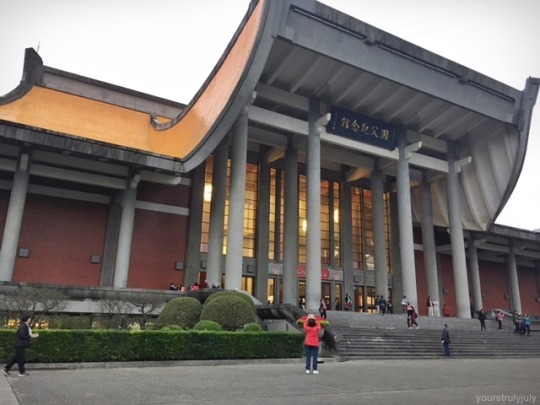
By riding the metro, take the Blue Line and alight at Sun Yat-sen Memorial Hall Station (BL15). I decided to walk from the memorial hall to Taipei 101 which I kind of regret because strolling for thousands of meters in the middle of winter breeze absolutely turned my legs into jelly! Wisdom from the road: Get a copy of the train route!
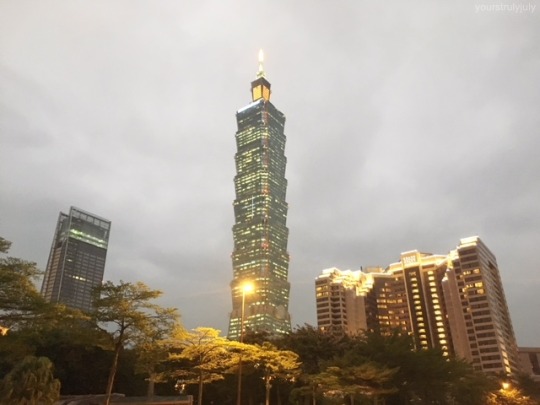


Finally!!! Some authentic Taiwanese food at Din Tai Fung located at the basement level of Taipei 101. Of course, I had the most-talked about xiao long bao. I was supposed to try it at their original branch in Xinyi Road, but on that very moment, I could no longer wait to give my feet a rest. Hahaha.
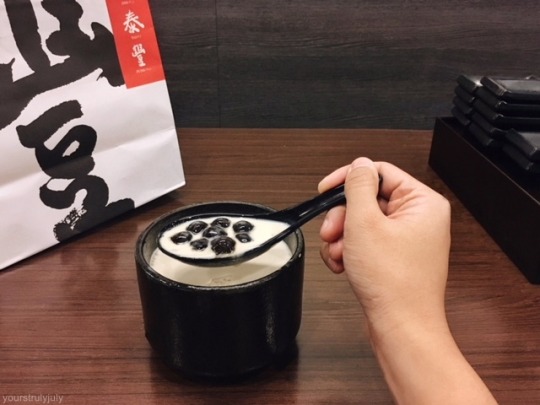
Prepare to get drunk by milk tea! Haha. Taiwan is the mecca for pearl milk tea lovers and I made sure to satisfy my daily fix.
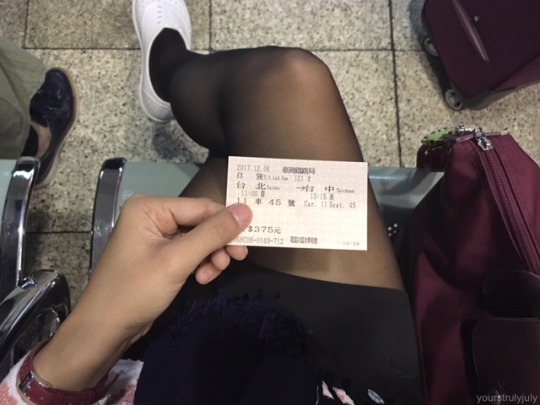
I set day 2 of my itinerary to meet a friend who apparently works in Taiwan. However, she is based in Tainan that’s about 4 hours by train south of Taipei, so we decided to meet halfway—in Taichung.
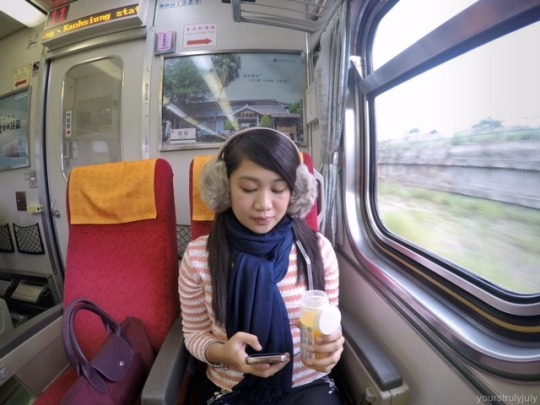
Confusion was written all over my face when I arrived in Taipei Main Station, but the guy at the information center was helpful enough to write the directions in Chinese and told me to just show it at the ticket booth. (Fare at NTD375/P665 one way for 2 hours)
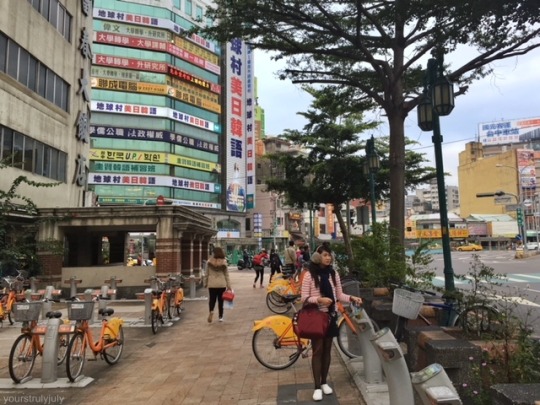
After alighting at the wrong station (panic rising all over me!) and leaving the wrong exit, after getting lost and frozen because Google Maps was not working, I can finally say it was one roller coaster of a reunion!

It was so amazing to be reunited with my close friend from grade school! I remember spending my lunch breaks in her cozy home. Fifteen years later and nothing has ever changed between us, except having our lunch about 900 miles away.

We initially planned to check Houli Flower Farm, but the lady at the station said that the farm was already closed for that day. We just hailed a cab from Taichung Station going to Rainbow Village and admired the vibrant artworks of a veteran soldier everyone fondly called Rainbow Grandpa.
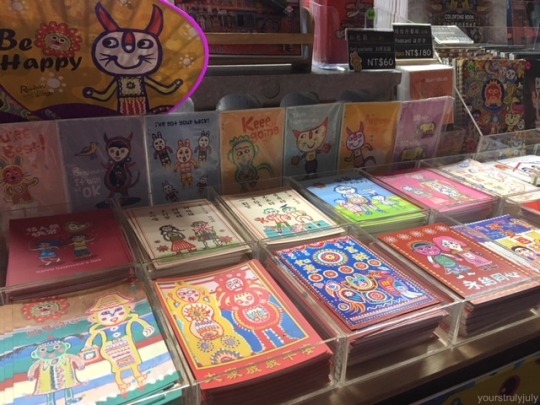
It was about midnight when I arrived from Taichung (I almost booked a room to spend the night because I was a bit anxious to go back to Taipei, but felt so relieved I made it alive!) that I woke up late on my 3rd day and missed breakfast hours at the hostel.
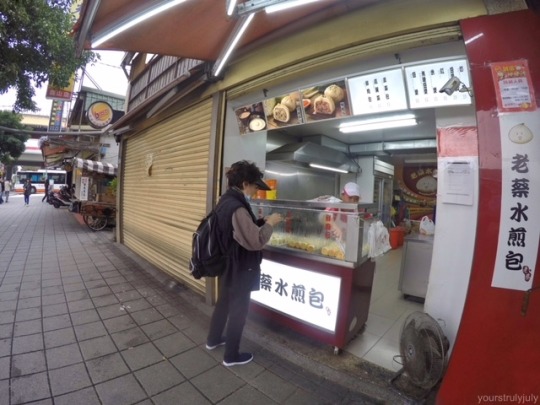
This stall was my lifesaver! They sell the best to-go steamed buns and soya milk! (NTD15/P26 each) P.S. They are all over Taipei! The rain did not stop me to proceed to Jiufen, an old mining town in the mountain area of Ruifang District.

It must be a blessing in disguise that Klook ran out of tickets for their Jiufen group tour because I got to explore it on my own. And by far, it was one of the highlights of my entire trip. How to get there? Use the metro and alight at the Blue and Brown Line interchange (Zhongxiao Fuxing Station), leave from Exit 2, ride Keelung Bus 1062 to Jinguashi and get off at Jiufen.
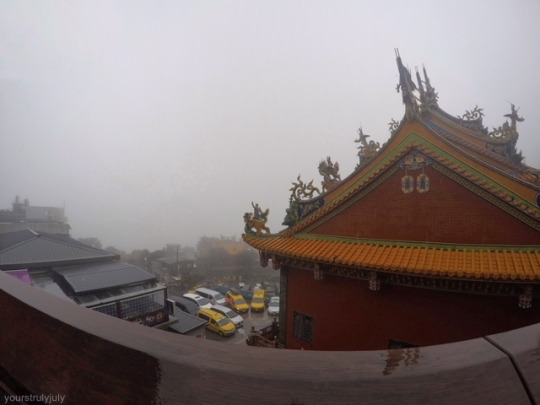
Relive the scenes from the animated movie Spirited Away by exploring the lanes and alleys packed with a wide variety of restaurants, shops and cafes. Peanut ice cream wrap is a must-try even on a cold weather!
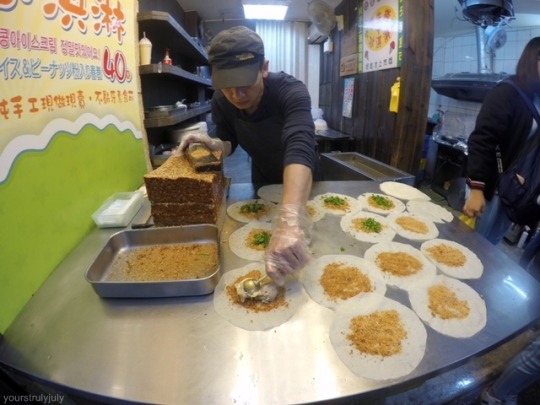

From Jiufen I went straight to Shilin Night Market to make the most of my food adventure in Taiwan. Stinky tofu, anyone? Take the Red Line and alight at Jiantan Station (R15).

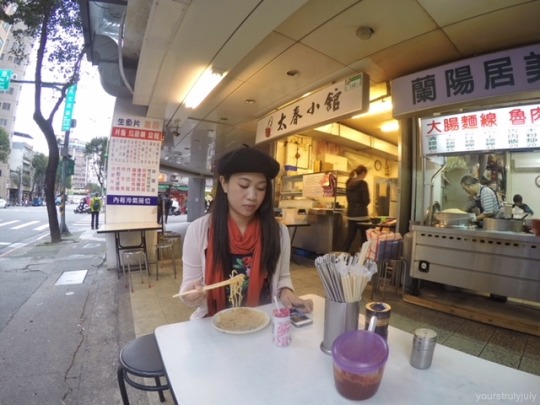
You know when they say, “Eat like a local.” Day 4 started with a brunch somewhere in a sidewalk and a visit to Dalongdong Bao’an Temple. By MRT, take the Red Line, alight at Yuanshan Station (R14) and leave from Exit 2. Walk down Kulun St., turn right at the intersection of Dalong St. (walk past Taipei Confucius Temple) and turn left on Hami St.

Bao’an Temple has received the UNESCO Asia-Pacific Awards for Culture Heritage Conservation in 2003. The Taipei Confucius Temple is another must-see destination within Datong District. Except for the ongoing pictorial, I sincerely loved the solemnity of the place.
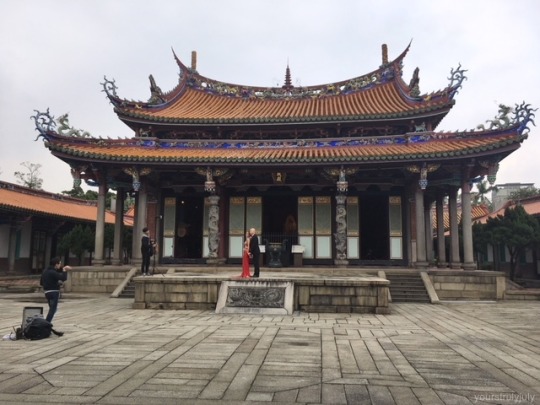

Next stop was the Chiang Kai-shek Memorial Hall, a national monument in honor and memory of their former president. Take the Green Line or Red Line and alight at CKS Memorial Hall Station (G10 or R08).


To say that I am an avid fan of Meteor Garden is an understatement. I remember hoarding pirated VCDs just so I don’t miss out on an episode, asking my dad to buy every single memento sold at Divisoria, and collecting their posters and giving away some to our neighbors because my room ran out of space.
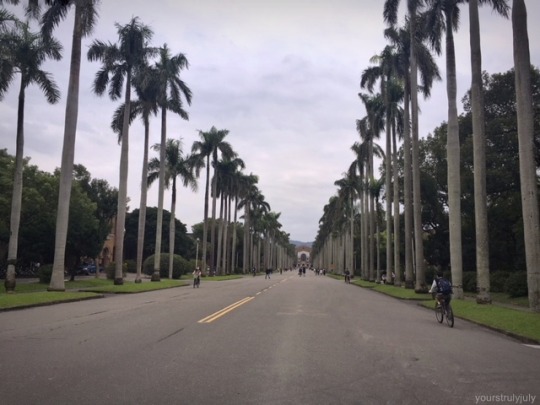
That is why I could not contain my fangirling moment when I reached the gates of National Taiwan University (Green Line, Gongguan Station or G07) where some of the scenes were filmed. Feel free to roam around and be your own version of Shan Cai.

My last day in Taiwan was spent at the ... airport! Haha. My flight back to Cebu was delayed for 4 freaking hours, but shops for pasalubong got me covered. I actually had no idea how to get there (my bad!) and I was already on the verge of panic ‘cause I might miss my flight and hiring a cab will surely dig a hole in my wallet (fare starts at NTD1,000/P1,780), so I just followed everyone carrying a luggage. Hahaha.

Going on a solo trip is quite challenging, yet it equally feels liberating. Unexpected circumstances had come my way, but it did not hinder me to enjoy such beautiful moments--of experiencing new culture, meeting new people, and discovering more about myself. ♥
#taiwan#taipei#taichung#solo travel#wanderlust#travel#journey#adventure#love#air asia#tourist#sun yat sen#taipei 101#view#landscape#rainbow village#personal#jiufen#shilin#night market#dalongdong baoan temple#temple#confucius#chiang kai shek#cks#meteor garden#f4#shan cai#dao ming si#national taiwan university
3 notes
·
View notes
Text
Fan Bing Bing’s International Business Lesson
Photo by George Baird
I had a sorta friend in college who smoked like a chimney and drank like a Supreme Court Justice. When people would point out the danger of his ways he would respond by emphatically noting that his grandfather also smoked and drank just as much and he was still alive and kicking at 88. Does anyone not see a problem with this analysis?
And yet, my firm’s international lawyers often hear something similar as an excuse for why some company or some person is doing XY or Z that is not legal. Sometimes they will add that so and so who is a native of the country in which they are doing business has told them that this or that is okay, which to me is the equivalent of relying on someone with no medical training saying it’s okay to smoke.
What has happened to Fan Bing Bing spurs me to mention the above. Fan Bing Bing is a terrific movie actress who recently got into BIG trouble with the Chinese tax authorities for having underreported her income via a dual-contract system in which only one contract is disclosed to the tax authorities. For more on this, check out China Movie Stars and The Two-Contract Problem. But it isn’t just movie stars that employ the two-contract tax dodge; many foreign companies and expats do as well:
Even if Fan Bingbing hasn’t done a single thing wrong (which is very possible), it wouldn’t be surprising to learn that tax evasion is rampant in the film business. Tax evasion is like a national sport in China. Mainland factories regularly misreport income by having payments go to a Hong Kong or Taiwanese holding company. So-called “independent contractors” in China rarely report their income because they and their foreign employer are both operating illegally. And the billion-dollar daigou business is profitable largely through tax and customs fraud.
Around once a month (and 4-5 times in December and January — not kidding), our international lawyers get a call from a foreigner in big trouble somewhere like China or Indonesia for having done something illegal. I myself have taken many of these calls and they usually start out with the person in trouble saying something like the following:
I always follow the law and I wanted to follow the law in __________ [country] but my ___________ assured me that this is how things are done in ___________[country] and so I reluctantly went along. And now I am in legal trouble for having done…..
The person who usually gets the blame is the accountant or general manager or even the person’s wife who is a native of whatever country in which the person is having his legal problems — I say “his” here because I cannot remember getting such a call from anyone not male. My tactic is to quickly push through this sort of discussion by bluntly saying, well yes, not paying your taxes or not doing X is illegal pretty much everywhere in the world and I am not aware of any country in the world where it is a defense to say that everyone else is operating illegally as well. So at this point, what I suggest is that we bring in a top-flight criminal lawyer and work on doing whatever we can to prevent you from going to jail and to reduce what you will need to pay.
Around ten years ago, A reader sent me an article regarding the Sri Lankan parents being denied the return of their 17 year old daughter by a United States judge because the family was unable to prove they were in the United States legally. The judge was denying the daughter’s return both for immigration reasons and because her parents’ credibility had been so damaged by their history of immigration untruths. The reader asked if we were aware of anything like this having happened in China or the United States with Chinese businesspeople and whether “something like this” can impact one’s business in China. I responded by listing out all sorts of examples we had seen where one’s immigration status has harmed a business.
Many years ago, I was involved in an international litigation matter involving two Russian fishing companies. One of the key witnesses for the Russian company on the other side was a woman who had secured a US visa based on her supposed extensive education and experience in the fishing industry in Russia. She had secured this visa by claiming a college degree from one of Russia’s best fishing institutes and by claiming to have spent many years working for one of its largest fishing companies. One of my firm’s crackerjack paralegals somehow acquired a copy of this person’s visa application and noticed that her college degree from a college in Town A in Russia had been stamped by someone in Town B in Russia. This was the equivalent of a Harvard degree with an official Yale stamp on it. In other words, it could never happen if the degree were not a fake.
Our next move was to depose this person and depose her we did. At her deposition, we asked her a series of questions intended to make clear we knew she had lied to get into the United States, including the following:
1. Who was your favorite professor? She said she had no favorite.
2. Name one of your professors. She said she could not remember a single one.
3. Name one professor at the entire college. She said she could not remember a single one.
4. Who was your best friend at college? She said she was too busy studying to have had any friends.
5. Name one fellow student at your college. She said she could not remember a single one.
6. List the classes you took. She gave a really vague answer.
7. Name some of the buildings on your campus. She could not remember a single one.
8. Describe the campus. She gave an incredibly vague description.
We asked the same sort of questions regarding the fishing company at which she had allegedly worked in Russia and we got the same sort of answers.
And guess what, this key witness for the other side never showed up to testify at trial, which greatly strengthened our case and probably helped us prevail. I have no doubt her failure to appear stemmed from her fear of her illegal immigration status being publicly exposed.
I was once contacted by a Russian-American company that wanted my firm to sue an American company over a debt. I pushed my client about skeletons in his and his company’s closet and he admitted he was in the United States on a student visa and so should not have been working at all. We talked about how his bringing this case would probably expose him to visa issues and how he should think long and hard before he brought it. He chose not to bring the case and instead to just walk away from a not insubstantial debt.
We have had to tell a number of foreigners in China the same thing when they have sought our help in collecting on a debt in China or in suing their Chinese partner for having run off with what the foreigner thought was its own business. If you or your business are not 100% legal in China, you have pretty much foreclosed your ability to sue anyone in China, no matter what they do to you. To put it bluntly, you are ripe for the plucking.
A handful of times (usually during periods of stepped-up visa enforcement), my firm has been contacted by foreigners with illegal businesses in China who have either been denied re-entry into China or have been told to leave. These people are desperately seeking our help to get them back into China. They are desperate because their profitable China based businesses cannot function without them. The odds of our being able to help them are slim.
One of the most underrated benefits of having a Wholly Foreign Owned Entity (WFOE) in China is that entity’s ability to hire foreigners and those foreigners’ ability to secure Chinese work visas (Z visas). These companies are legal and they have standing to sue and since their employees are working in China legally on Z visas, they have nothing to fear by testifying on the company’s behalf.
And we too have seen our share of double contracts. Many years ago, a European company hired us to sue an American company for having failed to pay around 2.5 million dollars for the sale of a used airplane (I have forgotten the exact amount). This company told us they had a written contract for this transaction and we told them we like their case. They then sent us the contract and instead of it listing the airplane price at $2.5 million, it listed it at $600,000. We raised the monetary discrepancy with the client who explained that “yes, this is what the contract says but the deal was for $2.5 million and the only reason it wasn’t written in the contract that way was because the other side insisted on it saying $600,000 to minimize its duties when it took the plane to its own country. We told them we were no longer interested in pursuing the case and as far as I know they ended up having to walk away from $2.5 million.
One of my favorite stories is when I went to Papua New Guinea to help a Sakhalin Island client secure the return of two helicopters. When I landed in Port Moresby, I was asked if I was in the country as a tourist or for business. The tourist visa was something around $35 and the business visa was something around $350, but I said “business” and I paid the much higher fee. I then flew to Goroka where I met the next day with the governor of the Eastern Highlands Province, Malcolm “Kela” Smith. I was told “Kela” means bald man. The first thing Mr. Smith did when I met with him was to check my passport. When it revealed I was there on a business visa, I could sense a change in his view of me. Though he never confirmed this to me, I am convinced that had my passport revealed I was in PNG on a tourist visa, Mr. Smith would either have had me thrown out of the country or he would have refused to meet with me because I was in the country illegally. Kela Smith ended up meeting with me and with my client and within a day or two we had a deal whereby my client would get his helicopters back.
With so many companies these days looking to set up in Asian countries with even weaker law enforcement than China, our international business lawyers are often finding ourselves stressing the advantages of scrupulously following a country’s laws even when doing so is difficult and expensive. Our experience is that this virtually always pays off in the end — economically, with stability, and with peace of mind.
The simple and obvious bottom line here is that if you are going to be doing business in a foreign country it pays to do so legally.
Fan Bing Bing’s International Business Lesson syndicated from https://immigrationattorneyto.wordpress.com/
0 notes
Text
Jimmy O. Yang on why he finds his 'Silicon Valley' role liberating, who he'd fight in Hollywood, and 'Crazy Rich Asians'
"Silicon Valley's" Jian-Yang has been a hit among fans and critics since his introduction, but saw an expanded role in season five of the HBO show.
Actor Jimmy O. Yang spoke with Business Insider about what he loves about the character, his newly published memoir about his immigrant experience, and an upcoming role in blockbuster "Crazy Rich Asians."
The character of Jian-Yang, played by Jimmy O. Yang, has been a fan favorite on HBO’s “Silicon Valley” since the start, but reached new heights as a delightful ruffian in season five.
Before this season, Jian-Yang had mostly existed as a comedic foil to TJ Miller’s blowhard Erlich Bachman character, but with Miller’s exit from the show, he got to take control of his own destiny. And boy did he.
“I think it turned out to be a blessing in disguise,” Yang said of Miller’s departure, as Jian-Yang became “more of a villain, not just a pain in the a-- to TJ, but to everyone else."
Yang, in real life, has had his own career ascent (by much less nefarious means). He's not only snagged roles in movies like the upcoming adaptation of “Crazy Rich Asians,” but also published a memoir on his experience immigrating to the United States at 13, and making it in Hollywood, which came out in March.
That path wasn’t easy, but Yang’s success has run counter to a maxim his dad loved to quote when he was growing up: “Pursuing your dreams is how you become homeless.” That hasn't been true for Yang — at least, not yet. And part of Yang's success in a tough business is certainly due to his charisma and casual hilariousness, which are evident as soon as you start talking to him.
Business Insider caught up with Yang in advance of the release of “Silicon Valley” season five on all digital platforms on June 11. We talked about what he loves about that “a------” character Jian-Yang, his ambitions and upcoming projects, and the casting director he’d be totally down to fight.
This interview has been edited and condensed for clarity.
Nathan McAlone: What was the audition process like for you at the beginning of “Silicon Valley,” back before season one?
Jimmy O. Yang: The original audition for it was a few months before the show even got picked up. The original pilot was a totally different script and Jian-Yang was totally different, actually one of the main characters. He was described as a Taiwanese guy who cursed like a pirate. He was one of the main dudes. Then I never heard back from the auditions. I just moved on and then a few months later, I got another audition for the same part, but the show had already been shooting — I think this was episode three — and it had become a smaller part. But deep down I was hoping it would revert back to whatever the original character was, that they had big goals for this guy. I was just really happy to get that three-line part at first.
McAlone: When did you have an indication that his role was going to be expanded? Was that based on them liking your interpretation of the character?
Yang: I think it’s a little bit of that. They saw that I was able to work with the guys pretty well. They were starting to see the chemistry of me and TJ [Miller, who played Erlich Bachman]. But between season one and two, I had no idea whether I was even going to come back for the second season. There was this whole crazy thing that happened where I was offered to be a series regular on a Yahoo show — some streaming content. But the problem is there’s always exclusivity, especially with streaming services, so it was either I was going to do the Yahoo show and maybe not come back to “Silicon Valley,” or take a chance with “Silicon Valley” and not do the Yahoo show. And I took a chance with “Silicon Valley,” and luckily they believed in me enough and I became a series regular the second season.
McAlone: I have a hard time telling, but how much of the banter of the characters on the show is improvised versus heavily scripted?
Yang: I think it’s a few things. The scripts are written really brilliantly. It’s one of the best-written shows I think on TV right now. And they also let us improv for sure, especially scenes with me and TJ, we would come up with different ideas. We get one take that's of the script and everything else we can play around and have fun doing. And then the third part is [producers] Alec [Berg] or Mike [Judge] or Clay [Tarver], or somebody like that, is on set and will give us some alt lines as we are going, which helps also. There’s a three-part comedy dynamic that makes the show really work.
McAlone: Were you apprehensive going into this season without TJ at all, or were you ready to branch out from that dynamic that you guys had?
Yang: I was definitely sad when I found out TJ wasn't coming back because he was my partner on the show and we had such a good dynamic going. But I think it turned out to be a blessing in disguise, seeing Jian-Yang becoming more of a villain not just a pain in the a-- to TJ, but to everyone else.
McAlone: Did you do much research into what the Chinese tech scene was like this season, for that side-plot?
Yang: I visited a bunch of startups in the off-season last year, talked to VCs, toured campuses of different places. And one of the main questions I was asking them was, “What is the China market like?” I got a lot of good information, like hardware: their hardware game is way superior production-wise to ours. But their software is a lot of what the show has showed you so far: it’s a little bit like “new internet,” “the new new internet,” “the new facebook,” whatever. Just doing stuff for the Chinese market because of government restrictions.
McAlone: I know when you inhabit a character in a TV show for many seasons, you grow a certain fondness for them. Are there particular things you are going to miss about stepping into this role on a regular basis when the show ends?
Yang: I think there's something great about being a dick on screen. There are no consequences, which is awesome. I think a part of us kind of wants to do that. Because he’s so straightforward and he doesn't care about hurting people’s feelings. I wish I could be more like that in real life in the off-season. But it’s kind of liberating to inhabit that.
McAlone: I know a lot of people who just love your character, do people stop you on the street?
Yang: Yeah, they scream out random things. They say, “God d----- Jian-Yang,” or like “not now.” A lot of TJ Miller sayings. They’ll say, “Not hot dog.” I’m a very different person in real life. I think Jian-Yang is kind of a version of myself 15 years ago, when I first came to this country. Now I’m a lot more Americanized and I would like to think I'm a much nicer person than he is. I think. People are sometimes surprised that I'm not actually that guy.
McAlone: What do you think people find so funny about him? For me, his character is so much beyond an accent. What do people tell you resonates with them about the character?
Yang: You don't see it coming, which is half of what comedy is. He is this quiet, seemingly nice kid, but he is pretty diabolical. I think it was earned because early in the seasons Erlich just gave him so much s--- and was trying to bully him. But it became a “David versus Goliath” story where he kept getting the upper hand, which is I think why people like the character throughout the years. Especially going up with big personalities like Erlich's character and Gavin’s character. There's something fun about that.
McAlone: You wrote a memoir [titled “How to American: An Immigrant's Guide to Disappointing Your Parents”]. What initially made you want to write a book and what was the process like for you?
Yang: It was very nice. It was a lot about my immigrant story, coming to this country as an outsider and also making it in Hollywood as an outsider, and not really expecting to do this at all. I went to school for economics and especially in Asian culture it's not really a viable job for my family to be an artist. Like my dad would always say, “Pursuing your dreams is how you become homeless.” An old-school Chinese dude. I just thought there is not too much material that is just an honest, funny immigrant story. And for me it was really tough to pursue what I love, and it worked out to some degree, and I want to share the story. Hopefully other kids whose parents have that old-school mentality can relate to the story, other immigrants can relate to the story so they don't feel so weird about themselves. It was a really rewarding process.
McAlone: When you are an actor, you are making yourself vulnerable in very different ways than if you're writing a memoir. Were there any elements you were nervous to write about?
Yang: I made sure to give everybody props that were deserved — like everyone on “Silicon Valley.” But certain people that I ran into in the business … like what the f--- is his name, the guy who cast “Modern Family,” Jeff Greenberg or something. He was a real f------ a------. And I just told the story how it was. He just yelled at me when I was this really young actor, and for no f------ reason, whereas the other casting directors have been really cool and nice. No, not really nervous. If Jeff Greenberg wants to call me and confront me about it, I’ll fight him.
McAlone: You said you are are very different from your character on “Silicon Valley,” is there anyone else in the cast that you think people would be super surprised how they are in real life?
Yang: Oh, interesting. I say I'm a bit different. I think on the surface I’m a bit different, but deep down I might be a dick also. Who knows. Zach [Woods, who plays Jared] is the kindest, nicest, most intelligent guy. And in a way you can kind of see that in the show, even though he’s nothing like the Jared character. Everyone is kind of like that. It’s a very exaggerated version of yourself.
McAlone: You’re in the upcoming movie adaptation of “Crazy Rich Asians” [in theaters August 15], how did you get involved and what was shooting like?
Yang: Well, being one out of three Asian people on TV. [Laughs]. No, it’s a really cool project and it’s a really important project. It’s the first studio movie in 25 years, since “Joy Luck Club,” to feature a full Asian cast. So when I heard the movie was being made, I was really stoked and I called my managers and I said, “Guys I know I’m a character actor, but let me audition for the leading role, I think I can do it.” My managers were like, “I don't know, Jimmy. I don't know how to tell you this, but they're looking for a good-looking guy for the leading role.” I was like, “Whatever, I get it.” I ended up auditioning for this character, Bernard Tai, he’s kind of the worst. They are forced to hang out with him. He's a ladies man in a way, playboy, bad boy — very cool and fun for me to play.
McAlone: Were they instantly into you getting the role or did it take some convincing?
Yang: They took a chance I think, because Bernard was supposed to be fat, physically and personality wise this massive a------. But they know I can take this character to the next level, which is great for them to trust me on that.
McAlone: Now that you’re a known entity in Hollywood, with the success of “Silicon Valley” and other roles, and can maybe take a breath and see which direction you want to go in, what projects do you think you’ll gravitate toward?
Yang: A lot of more meaningful projects. You know something like “Patriots Day” that I did a few years ago, which is a drama, is very different than comedy. That was super rewarding. I want to do more of that and also my own writing. I have some scripts, I’m putting a couple of projects together with people I want to work with. I think that's the most exciting part, when you can hopefully create your own content and find the people that you love that you get to work with.
SEE ALSO: We got Gilfoyle's entire PowerPoint presentation explaining cryptocurrency from HBO's 'Silicon Valley,' and it's both useful and hilarious
Join the conversation about this story »
NOW WATCH: This 19-year-old opened a restaurant with a $155 tasting menu
0 notes